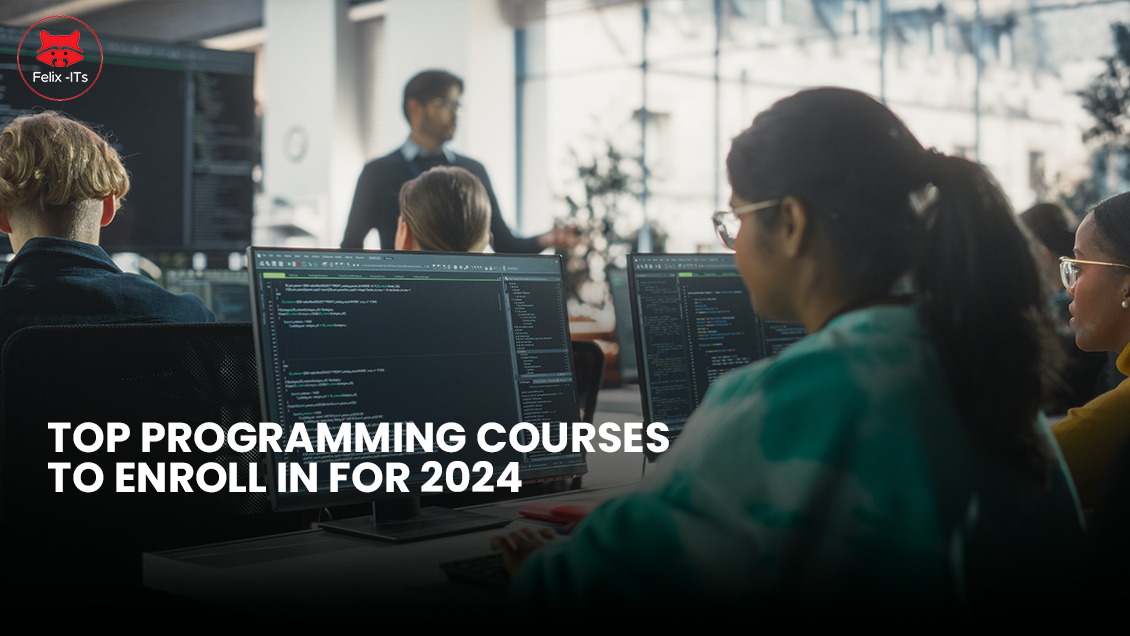As a student or professional in programming, staying updated with the latest programming languages is crucial. To excel in the tech world, it’s essential to know the most in-demand skills. The courses mentioned in this blog will help you stay current and boost your career prospects in technology.
Python Programming Course
Python is celebrated for its clean syntax and versatility, making it an excellent choice for beginners and experienced developers alike. The course starts with basic Python syntax and data structures and then advances to more complex topics like object-oriented programming and error handling. Students will learn to use powerful libraries such as NumPy for numerical data, pandas for data manipulation, and Matplotlib for data visualization. Practical applications include web development with Flask or Django, automation, and data analysis, preparing students to handle real-world programming challenges effectively.
R Programming Course
R is a specialized language for statistical analysis and data visualization. This course covers R basics, including data types, control structures, and functions. Students will delve into data manipulation with dplyr, visualization with ggplot2, and statistical modeling techniques. The curriculum also introduces advanced topics like regression analysis, time-series analysis, and clustering. Practical exercises involve working with real datasets, enabling students to derive insights and create comprehensive reports, making it a strong choice for aspiring data analysts and statisticians.
SAS Programming Course
SAS (Statistical Analysis System) is a powerful tool for data management, statistical analysis, and reporting. This course begins with SAS programming fundamentals, including data step processing and PROC SQL. Students will learn to manage and manipulate large datasets, perform complex statistical analyses, and create detailed reports. The course also covers SAS Macros for automation and efficiency. It is particularly beneficial for professionals in industries such as healthcare, finance, and research, where robust data analysis and management are critical.
Java Programming Course
Java is a robust, object-oriented language used in a variety of applications from enterprise solutions to mobile apps. The course covers core Java concepts such as classes, objects, inheritance, and polymorphism. Students will also learn about exception handling, collections, and multi-threading. Advanced topics include Java frameworks like Spring for enterprise applications and Hibernate for database management. By the end of the course, students will be able to build cross-platform applications and understand Java’s role in large-scale systems and Android development.
JavaScript Course
JavaScript is essential for creating interactive and dynamic web content. This course starts with basic JavaScript syntax and programming concepts, then moves on to advanced topics such as asynchronous programming with promises and async/await. Students will explore the Document Object Model (DOM) for manipulating web pages and learn about modern frameworks and libraries like React, Vue.js, and Angular. Practical projects involve building interactive websites and web applications, equipping students with the skills needed to enhance user experiences on the web.
AngularJS Course
AngularJS is a framework for building dynamic, single-page web applications. This course covers AngularJS fundamentals, including directives, data binding, and dependency injection. Students will learn to build scalable applications with a modular structure using AngularJS components and services. The course also introduces concepts like routing, form validation, and unit testing. By the end of the course, students will be able to create sophisticated, responsive web applications with AngularJS, enhancing their front-end development capabilities.
C Programming Course
C is a foundational language known for its efficiency and control over system resources. This course covers C programming basics such as syntax, operators, and control structures. Students will learn about pointers, memory management, and file I/O, as well as data structures like arrays, linked lists, and stacks. The course also introduces algorithms and their implementation. Understanding C is crucial for developing software where performance and resource management are critical, and it provides a strong basis for learning other programming languages.
Linux Programming Course
Linux programming involves developing applications within the Linux operating system environment. This course starts with Linux basics, including the command line and shell scripting. Students will learn about system calls, process management, and inter-process communication. Advanced topics include writing system-level programs, network programming, and working with Linux APIs. The course also covers debugging tools and best practices for developing robust Linux applications. It is ideal for those interested in systems programming, server management, and embedded systems.
Node.js Course
Node.js allows JavaScript to be used for server-side programming, enabling the development of scalable network applications. This course covers Node.js basics, including event-driven architecture and asynchronous programming. Students will learn to build RESTful APIs using Express.js, work with databases like MongoDB, and handle real-time communication with WebSockets. The course also explores deployment and scaling techniques. By the end, students will be proficient in creating high-performance web servers and applications, leveraging JavaScript across the full stack.
C++ Programming Course
C++ builds on C by adding object-oriented features, making it a powerful language for system/software development and game programming. This course covers C++ basics, including classes, inheritance, and polymorphism, as well as advanced topics like templates and the Standard Template Library (STL). Students will learn about memory management, operator overloading, and concurrency. The course also includes practical exercises in developing complex software applications and understanding performance optimizations. C++ knowledge is crucial for developing applications that require high performance and efficient resource management.
Final Thoughts
A career in programming offers exciting opportunities with high demand and growth potential. Starting with the right programming course is crucial for success. Felix-IT Systems is a top choice for this, providing a comprehensive curriculum, experienced faculty, and industry-focused learning. Their standout feature is job placement support after course completion, ensuring you’re not only trained but also ready for the job market. Launch your programming career with Felix-IT Systems and gain the skills for a bright tech future.


